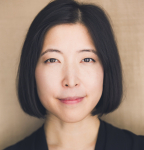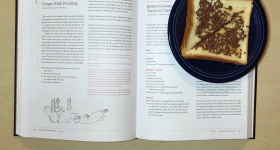Chapter 2
I suppose I should warn you that I tell a story like a woman: looping into myself, interrupting. Things have never seemed straightforward to me, the path has never been clear. When I was a child, first discovering numbers, the secrets they yielded, the power they held, I imagined I would live my life unchecked, knocking down problem after problem that was set before me. And in the beginning, because I outstripped my classmates, my parents and even my teachers, it seemed possible that it would be so. That was pure hubris. I would have been better off reading Greek tragedies.
The first thing I remember being said of me with any consistency was that I was intelligent, or quick — and I recognized even then that it was a comment leveled at me with disapproval as much as admiration. Still, I never tried to hide or suppress my mind as some girls do, and thank God, because that would have been the beginning of the end.
I grew up in the 1940s and 1950s in the small town of New Umbria, Michigan. The women there were mothers or grandmothers, a handful of elementary-school teachers and maids, the town librarian and the school nurse. Back then, we were expected to get married and settle down, not go to college or have careers. But my family and I were newcomers where most residents went back multiple generations, and so while I never really fit in — or perhaps because of it — I also never felt that such rules applied to me. Before, we had lived in Virginia, but we had moved when I was young enough that I had no memories of this. When anyone asked me where I was from, I didn’t know how to answer. All I knew was the answer was not New Umbria or Virginia, because whenever I gave those as answers, I was always met with more questions. “No, where are you really from?” Or, “Where are your parents originally from?”
When I asked my parents, “Where am I really from?” they would change the topic or look sad or tell me not to be bothersome. “You were born in Virginia,” my father said, “as was I. And that’s the end of it.”
My mother had been born in China, but when I asked her anything about it, she always said, “I don’t know.” And I believed she didn’t know in the way I didn’t know. I thought perhaps China had been for her like New Umbria was for me, a place she didn’t belong, which had never felt like home, and that was how she ended up in America, with us.
Neither of my parents had any living relatives, so there was no one else I could ask. To some degree I accepted this uncertainty as part of who I was in the context of our town, but also in the larger context of life and history. I felt as if I lived outside of time and place, like in a fairy story.
Many of the things I believed to be true would turn out to be wrong, but this is what I was sure of back then: my father was a war hero with a medal to prove it, and he had been hired as the lead machine engineer at the New Umbria Glass Company, so he was treated with respect wherever he went. As his wife, my mother was usually afforded some modicum of courtesy, but she was Chinese by birth, and so we were never very sure what response she — or I — would provoke, wherever we went, where we were always the only ones of our kind. I heard her called a dirty Jap once, and China Doll and Red China, and while I flushed red with shame, my mother never so much as flinched at the slurs, so that I was never sure that she heard them. In any case, she was also very young and beautiful, and drew looks and comments wherever we went.
These facts alone made her extraordinary, but she was different for other reasons as well: she was happiest, it seemed, lying in our backyard on her stomach, watching lines of ants file by or the grass wave in the breeze. She was always dressed as if for winter — in long sleeves and thick stockings — and did not do typical mother things; it was my father who took care of us, the one who cooked and bought our groceries and clothes. My mother’s attention drifted elsewhere — to the seeds spiraling down in the wind, or the distant wingbeats of birds, or the passing shadows of clouds. For the most part she was quiet, often subdued, and prone to periods of sadness. She touched me very rarely, and even those instances were less and less as I grew older, though I longed for them.
Between my mother and father there was kindness, and I think respect — but there was also an unbreachable distance. They never touched each other, and in fact rarely spoke, though it seemed to me my father was always trying to make her happy — bringing home pretty scarves that he draped over her chair, or leaving heart-shaped rocks on the kitchen counter, which she tucked into her pocket with a smile. She spoke with an accent and told me stories about brave princesses and angry kings, and the story of the tenth muse. Everything she told me felt like a secret with a message hidden inside.
I told her secrets, too — about the spiral I saw twirling out from the cut side of a cabbage when she sliced it in half, and how it echoed the spiral I’d once seen on the shell of a snail. The way one half of a leaf was a perfect mirror of the other half. I told her about the games I played with numbers, how I’d noticed that two odd numbers added together always made an even one, or how an odd number and an even always made an odd. And my mother listened, and nodded, and told me there were patterns everywhere in nature, and that numbers held their own hidden stories that unspooled if you followed them far enough along — stories that once you knew the beginning, ran on and on. Even back then, I realized the power of what my mother was telling me: that numbers underlay the mysteries of nature. That if you could unlock their secrets, you could catch a glimpse of the order within.
I did quite well in school until third grade, when I was assigned to the class of a teacher who took an instant dislike to me. Mrs. Linen was a stiff, lean woman with little patience, and was in the habit of giving us busywork, which we were supposed to complete in silence. I had gotten in trouble more than once for completing this work too quickly, but it came to a head one day when she asked us to solve 1 + 2 + 3 + 4 + 5 + 6 + 7 + 8 + 9 and went back to her desk.
I raised my hand immediately, and when she sat down at her desk and took out a folder, and seemed likely not to notice my outstretched arm, I waved it around, stretching forward in my chair.
She looked up. “Yes?” “Forty-five,” I said. “Forty-five?”
“That’s the answer.”
Mrs. Linen sighed. “How many times do I have to tell you, guessing does not count?”
She had, in fact, said this to me many times, and each time it had wounded me. “I’m not guessing,” I said. “I never guess.”
She stood up then and strode to my desk. She picked up my paper, and when she saw it was blank, she cried, “You didn’t even write the problem down! If you don’t show your work, you get no credit. Now stop wasting my time.”
Back then this idea of showing work was one of the most difficult concepts for me to understand. What did it mean to show your work? Why did I have to write something down if I understood it perfectly? And when was it necessary, and when was it not? For instance, if I didn’t have to show my work to say 1 + 2 = 3, why did I have to show my work for 1 + 2 + 3 + 4 + 5 + 6 + 7 + 8 + 9 = 45? How were they different? This was a far more complicated idea for me than that of simple sums because it involved tracking the movements of my own mind, which was a skill that took me much longer to learn.
Now I would be able to tell you that I had solved the problem so quickly because I’d realized a simple pattern: that if you took the numbers on the opposite ends of the sum, 1 and 9, and added them together, they equaled 10. So did the next two numbers moving inward: 2 and 8. As did 3 and 7, and 4 and 6, with only 5 left over. So four tens and a five. Almost two centuries ago Carl Gauss had presented his teacher with the formula to solve a similar problem, but that explanation took more sophistication than I was capable of back then: for me, math and its attendant pattern-making was purely intuitive.
Perhaps this is what frustrated Mrs. Linen about me — the inner workings of my mind were inaccessible to myself, and thus, to her. After standing over my desk sternly for a moment, she said, “Very well, add 1 + 2 + 3 + 4 + 5 + 6 + 7 + 8 + 9 + 10 + 11 + 12 + 13 + 14 + 15 + 16 + 17 + 18 + 19.”
“One hundred ninety,” I answered at once. (This I was able to deduce because of course it was the same as the first answer added to itself plus 10 tens.)
“Nonsense,” she said.
“One hundred ninety,” I said.
Mrs. Linen went to her desk and began writing. After her hand stopped moving, she looked down for a long moment. Then she looked up, met my eye, and said, “You don’t know everything.”
“I know,” I said. Of course I didn’t—that was the unmet goal, wasn’t it, toward which I was hurtling as fast as I could, headlong?
She stood up and went to the front of the blackboard. “Katherine, please come here to the front of the room,” she said.
I obeyed.
She took a piece of chalk and drew a small circle on the blackboard. “Put your nose inside the circle and do not move at all until class is over,” she said. This was a punishment she reserved for the worst infractions in our class: when boys fought or said bad words, they were often made to stand in front of the classroom like this. I was the first — and it would turn out, only — girl to be punished this way.
When I hesitated, Mrs. Linen put her hand on the back of my head and pressed it against the blackboard until my nose was firmly squashed in the center of the circle she’d drawn.
The other children had only ever been made to stand like this for half an hour, but I stood for over two hours with my face pressed against the blackboard. My knees grew stiff and my back started to ache. I kept waiting for Mrs. Linen to release me, but even after the last bell had rung to announce the end of school, and I turned away from the board to leave, Mrs. Linen said, “I did not give you leave to move, Katherine.”
I knew I would miss the bus if I didn’t go with the rest of my classmates, but I pushed my nose against the board again and felt as if anything could happen.
I heard Mrs. Linen leave the room. Still, I did not move. I heard her return and sit down at her desk. I heard her shuffle through some papers. I heard the scratch of her pen. And then after some very long minutes, she said, “You may take a seat, Katherine.”
So I went to sit at my desk, my legs trembling.
“I called your mother,” Mrs. Linen said. “She’s on her way.”
My parents arrived together, tense and unsmiling. They greeted Mrs. Linen and sat beside me in the small student-size chairs. Our classroom was decorated with maps and giant-size letters and drawings, and my teacher stood in front of them. She struck an imposing figure, and it was only then that I noticed how out of place my parents looked, squeezed into child-size furniture. My mother, especially, looked ill at ease, and this frightened me. Until that moment, my parents had been the ultimate authorities in my world.
And now I felt as if I had gotten them into trouble, as if they had to answer to Mrs. Linen as well.
“Your daughter refuses to follow instructions,” Mrs. Linen said. “She won’t show her work, and she skips ahead without waiting for instructions.”
“I’m not sure I understand what you mean,” my father said. “Is she in trouble for being advanced?”
“No,” said Mrs. Linen. “She reads ahead and interrupts. She doesn’t listen, and she shows off. It disrupts my lessons and makes the other children feel bad. I won’t have it in my classroom.”
“That’s not true,” I gasped. “I listen.”
“This is what I’m talking about with the outbursts,” Mrs. Linen said. She shook her head. “No self-discipline, I’m afraid.”
“I have self-discipline,” I interjected, but my father held up his hand to silence me and nodded at the teacher. “We’ll talk to her,” he said. “We’ll see to it that she behaves.”
“Please be sure that she does,” Mrs. Linen said. And then she motioned at the door, to say she was done with us. My parents stood up quickly, my mother took me by the hand, and we left.
At home my father sat me down and said, “Tone it down.”
“I didn’t do anything wrong,” I said. “I answered her questions.”
“Then do it without showing off,” my father said.
I flinched. The problem was I enjoyed answering questions. Numbers were predictable and knowable, and I liked getting them right. Why was it bad to take pleasure in this? Why was it necessary to pretend otherwise, when the thing I loved most about numbers was their very straightforwardness? Other children were praised when they answered — only I was punished. Tears sprang from my eyes. I choked them back.
My mother, sitting silently next to me, unexpectedly reached over and took my hand. I sidled up to her, eager for comfort. “Katherine,” she said, and her voice was kind. “Do your best. No matter what anyone says. Next year you’ll have a different teacher, and things may change then. Life is long, and nothing lasts forever. So don’t worry, and maybe for now, don’t draw attention to yourself.” My mother often said things like this that seemed both wise and wrong at the same time: my best could not help but draw attention — that was the problem.
“Why do I have to do as she says?” I asked. “What if she’s wrong?"
“She’s your teacher,” my father said. “She’s in charge, and you have to treat her with respect, not think that you know better than her.”
The injustice of this choked me. But I told my parents I would do as they said. And I did. I stopped talking in class, and soon I stopped listening, too. I read my textbooks and ransacked the school and public libraries for more. Because it was impossible to please my teacher, I learned to please myself. I stopped trying to follow her guidance and followed my own interests instead.
The following year my new teacher immediately skipped me forward a grade, and for the most part things were much better. Still, I have always thought of my confrontation with Mrs. Linen as a defining moment from school. It was how I became a freethinker, the moment I learned to distrust authority and question whether grown-ups had my best interests in mind. For that, I am grateful, because without this early preparation, I would never have made it in life. Still, I wonder now why it had to be necessary, and why my teacher disliked me so much — whether it was because I was a girl, or my family wasn’t from New Umbria, or because I was half Chinese. But it occurs to me now that even if those were not the reasons she treated me badly, they were the conditions that made it possible to do so.
Excerpt from THE TENTH MUSE by Catherine Chung. Copyright 2019 by Catherine Chung. Excerpted by permission of Ecco, an imprint of HarperCollins Publishers.
Author Website: https://www.catherinechung.com/
Author Photo Credit: David Noles
Cover Image: Courtesy of Ecco










Comments